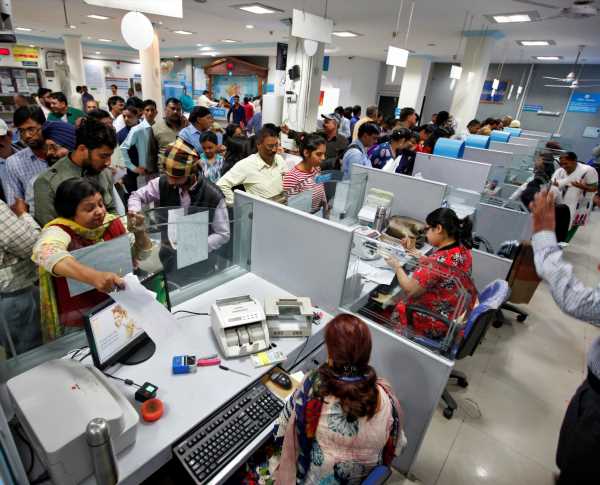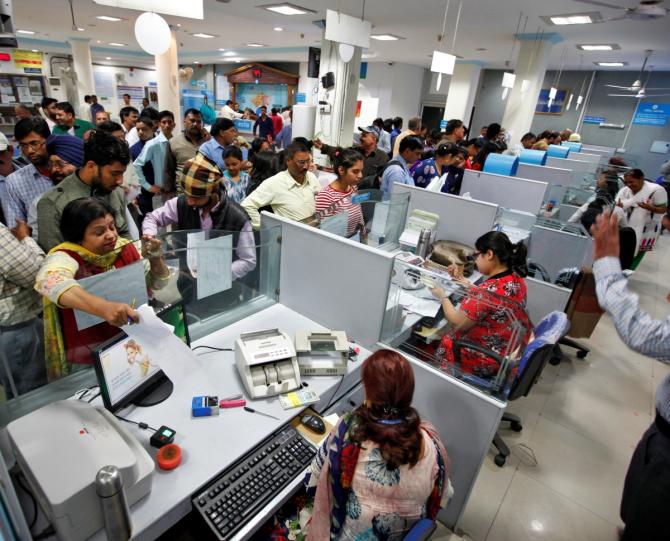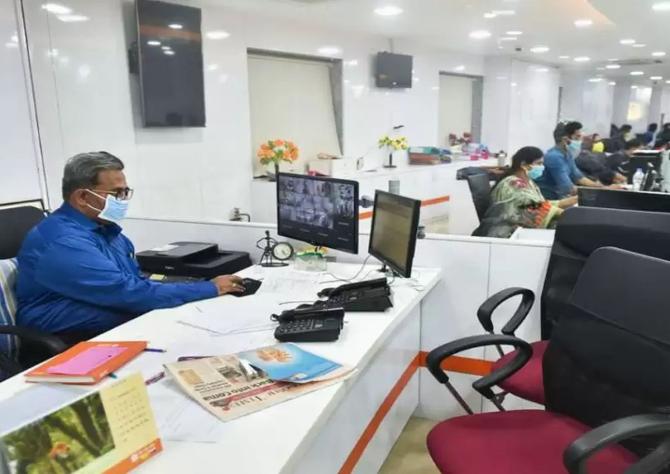Currently, banks are closed every second and fourth Saturday of a month.
Why shouldn’t they be shut every Saturday?
When most customers carry their banks in their pocket (the app on the mobile phone), there is no need to keep banks open on Saturdays, argues Tamal Bandyopadhyay.
Media reports say the government has asked the premier bankers’ body, Indian Banks’ Association (IBA), to initiate the process of negotiations for the 12th bipartite wage settlement for bank employees and finalise it by December 1.
The wage revision for the employees of public sector banks (PSBs) is due from November 1, 2022.
The 11th bipartite wage negotiations, concluded in 2020 after three years of intense discussions between the IBA and the bank employees’ unions, agreed upon a 15 per cent wage revision.
For the clerical staff, called workmen, this translated into an annual outgo of Rs 3,385 crore (Rs 33.85 billion) for the banks covered by the wage settlement.
Including the officers, the last wage revision led to an additional yearly outgo of Rs 7,898 crore (Rs 79.88 billion).
Around 379,000 officers and close to 500,000 workmen of PSBs and a few private and foreign banks were part of the deal. Overall, 29 banks participated in the exercise. One settlement lasts for five years.
The combined net profits of 32 listed private banks and PSBs in the financial year 2022-2023 were up 40.56 per cent to Rs 2.29 trillion.
The profits of PSBs as a group exceeded Rs 1 trillion, about 57 per cent higher than the previous year.
Only the salaries of clerical workers of private and foreign banks are covered by this, unlike PSBs, whose officers too are part of the wage agreement.
Incidentally, the 10th bipartite wage settlement, effective from November 2012, offered a 15 per cent wage hike for PSB employees, lower than the 17.5 per cent hike given in the previous settlement.
However, this was not exactly comparable as the basis of calculation of the previous hike was an employee’s remuneration, including pension and gratuity, unlike the 10th bipartite settlement that did not include retirement benefits.
The last agreement introduced the concept of performance-linked incentives, based on operating and net profits of the PSBs. For the private and foreign banks, it was optional.
This was the first attempt to treat PSBs based on their performance.
PSBs are very different from each other when it comes to parameters such as business per employee and profit per employee, return on assets and return on equity, among others, and yet their employees are treated equally for wages. The performers are not rewarded.
Of course, the employees can always say that they spend long hours in office, give their best, and the banks’ performance depends on the quality of the senior management (read managing director and executive directors).
Why should they be punished for the non-performance of the senior executives, who are not covered by the wage pact?
Still, an industry-wide wage pact may not be the best performance-appraisal process as the benchmark for such a pact typically is the paying capacity of the weakest bank in the pack. This is unfair to the employees of strong and profitable banks.
The performance-linked incentive, introduced in the last wage pact, has tried to address this issue partially.
This time around, going by media reports, the government is stressing the importance of fairness and equity in the wage revision to ensure that the compensation structure remains competitive with other players in the banking industry.
This is critical when competition is getting fiercer and banks are fighting it out hard, both for deposits and loans.
Apart from job security, PSB employees at the junior and middle levels are looked after better than their peers in private banks.
As they climb the ladder, the difference shrinks. Roughly, from Scale IV (chief managers), private sector bankers start earning more than their counterparts in the public sector.
This is why the attrition level in PSBs at Scale IV and above is pretty high.
Retaining talent without offering adequate compensation is the biggest challenge for the HR division of PSBs.
At the same time, the perks offered can be monetised and the PSBs should shift to the cost-to-company concept.
That will help one appreciate the difference in the pay packages between private and public sector bankers.
Besides salary, private sector bankers also own the shares of their banks under the employee stock option scheme.
Even though all 12 PSBs are listed, their employees are not given the stock options.
At least two PSBs have approached the government with proposals to give stock options to their employees, but the files have been gathering dust in the finance ministry’s banking division. (Some of the PSBs have sold shares to their employees at a discount to the market price under the employee stock purchase scheme.)
One question remains though: If there is pay parity with the private sector, can the present recruitment process continue? Can the bankers have guaranteed employment till they reach the retirement age, besides assured pension?
The wage pact does not cover the MDs and EDs (and in case of State Bank of India, also the chairman) of PSBs whose remuneration packages are linked to those of bureaucrats. But, isn’t the job of bureaucrats and bankers, who deal with money, very different from one another?
Incidentally, over a decade ago, in February 2012, the finance ministry introduced performance-linked incentives for the whole-time directors or the chairmen, MDs and EDs of PSBs. The performance evaluation metrics included 12 quantitative parameters — such as net profits, level of bad loans, cost-to-income ratio, among others — that carried 70 per cent weightage and six qualitative parameters — such as business strategy, HR development and innovation — with 30 per cent weightage.
A sub-committee of the board, called the remuneration committee, has been entrusted with the job of assessing performance of the top brass on these parameters.
The amount was small but the arrangement made the senior executives of PSBs smile, though only for a few years.
Once the Reserve Bank of India launched the asset quality review in the December quarter of 2015, leading to the discovery of heaps of bad loans, the performance-linked incentives vanished into the blue.
The banking division of the finance ministry has also dismantled the ritual of signing memorandum of understanding with the bank managements on the annual goals.
The first wage settlement was signed in October 1966.
Apart from the IBA, the Bombay Exchange Banks’ Association, representing foreign banks in India, was involved in the first pact, which lasted three years.
The Bombay Association does not exist anymore and foreign banks operating in India have joined the IBA.
The continuation of the industry-wide wage pact for almost six decades tells the story of the trade unions’ sway over the industry.
This is quite unique in the digital era when every bank aspires to be a tech company.
This also brings us to a long-standing demand of the unions, and a legitimate one: The five-day work schedule.
Currently, banks are closed every second and fourth Saturday of a month.
Why shouldn’t they be shut every Saturday? When most customers carry their banks in their pocket (the app on the mobile phone), and given the phenomenal strides in the payments space that India has made, there is no need to keep banks open on Saturdays.
Another contentious issue has been pension as a third retirement benefit, besides gratuity and provident fund.
It has a chequered history, beginning with a nationwide strike on April 30, 1992. In fact, the 1990s were fraught with frequent bank strikes on this issue.
So far, it has not been resolved fully. A relevant demand is the updation of pension, something RBI employees enjoy.
A banker who retired early this century and is now in her 80s, gets a pittance in the form of pension since it is linked to the basic salary.
As the PSBs are in good shape now, it’s time to address this anomaly.
Tamal Bandyopadhyay, author of Roller Coaster: An Affair with Banking, is a senior advisor to the Jana Small Finance Bank Ltd.
Disclaimer: These are Tamal Bandyopadhyay’s personal views.
Feature Presentation: Rajesh Alva/Rediff.com
Source: Read Full Article


